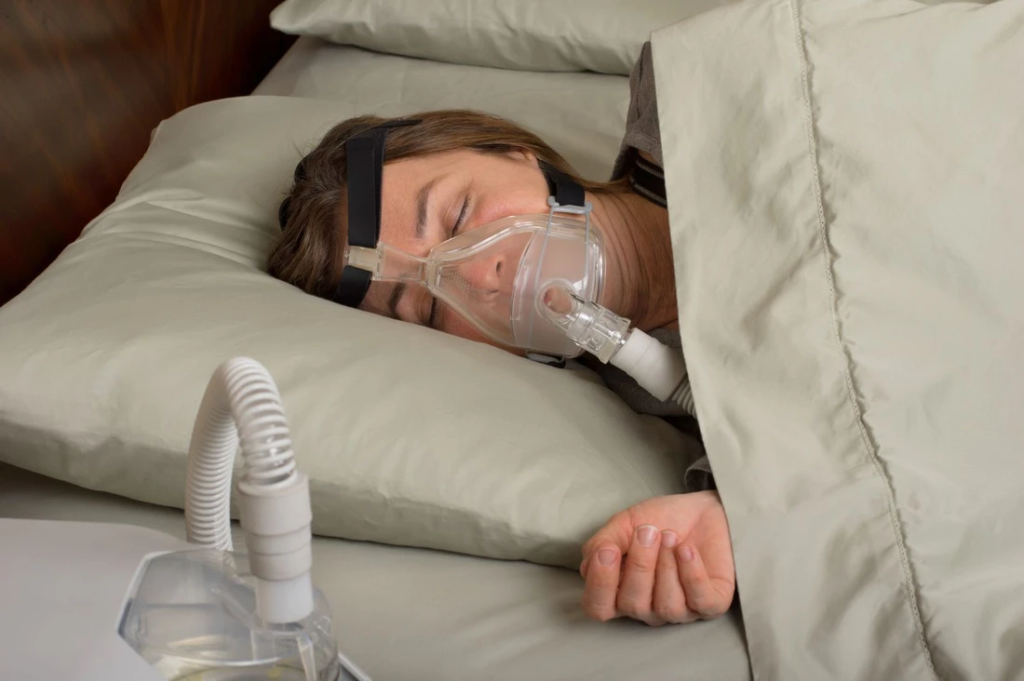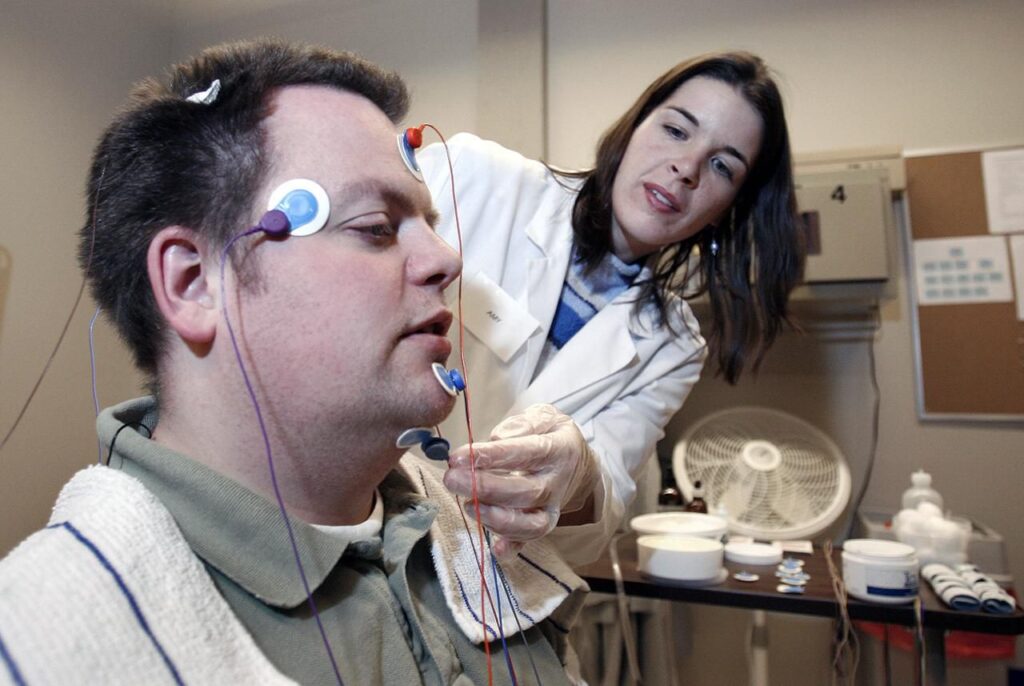Understanding the Sleep Study Test: Importance and Process

A sleep study test, also known as a polysomnography, is a diagnostic tool used to assess various aspects of a person’s sleep. It is an essential medical procedure that helps identify sleep disorders and provides valuable information for treatment planning. Understanding the importance and process of a sleep study test is crucial for individuals seeking to improve their sleep quality and overall well-being.
What is a Sleep Study Test?
A sleep study test is a comprehensive evaluation of an individual’s sleep patterns and behaviors. It involves monitoring several physiological variables during sleep, such as brain activity, eye movement, heart rate, blood oxygen levels, and muscle activity. This data is collected using specialized equipment and electrodes placed on the scalp, face, chest, and limbs.
The Basic Definition of a Sleep Study Test
Essentially, a sleep study test provides a detailed analysis of an individual’s sleep architecture, sleep stages, respiratory patterns, and potential sleep disorders. It allows healthcare professionals to observe and analyze any abnormalities or disruptions in sleep patterns that may affect overall health and well-being.
Different Types of Sleep Study Tests
There are different types of sleep study tests that can be conducted, depending on the specific needs and concerns of the individual. Some common types include:
- Nocturnal Polysomnography: This is the most comprehensive type of sleep study, usually performed overnight in a specialized sleep center. It monitors various aspects of sleep, including brain waves, eye movements, muscle tone, heart rhythm, and breathing patterns.
- Home Sleep Apnea Testing: In some cases, individuals may undergo a simplified version of a sleep study test at home. This can involve monitoring breathing patterns, heart rate, and blood oxygen levels using a portable device provided by a healthcare professional.
- Multiple Sleep Latency Test: This test is often used to diagnose narcolepsy and assess excessive daytime sleepiness. It measures the time it takes for an individual to fall asleep during multiple nap opportunities throughout the day.
Each type of sleep study test serves a specific purpose and provides valuable insights into an individual’s sleep quality and potential sleep disorders. For example, nocturnal polysomnography is particularly useful in diagnosing conditions such as sleep apnea, restless legs syndrome, and periodic limb movement disorder. It allows healthcare professionals to observe the frequency and duration of breathing interruptions, limb movements, and abnormal sleep patterns.
Home sleep apnea testing, on the other hand, offers a more convenient and cost-effective option for individuals who may not require the extensive monitoring provided by a sleep center. It can be especially beneficial for those who suspect they have sleep apnea, a common sleep disorder characterized by pauses in breathing during sleep.
The multiple sleep latency test is specifically designed to evaluate daytime sleepiness and diagnose narcolepsy. By measuring the time it takes for an individual to fall asleep during scheduled nap opportunities, healthcare professionals can assess the severity of excessive daytime sleepiness and determine the presence of narcolepsy.
Overall, sleep study tests play a crucial role in identifying and understanding sleep disorders, allowing healthcare professionals to provide appropriate treatment and interventions to improve an individual’s sleep quality and overall well-being.

The Importance of Sleep Study Tests
Sleep study tests play a vital role in the identification of sleep disorders and the formulation of appropriate treatment plans. They offer valuable insights that can significantly improve an individual’s quality of life.
Furthermore, sleep study tests are not only beneficial for diagnosing existing sleep disorders but also for uncovering potential underlying health issues that may be affecting an individual’s sleep quality. These tests can reveal conditions such as heart problems, neurological disorders, or even mental health issues that may manifest during sleep, highlighting the interconnectedness of sleep and overall well-being. Learn more about neurological disorders on https://www.hopkinsmedicine.org/health/conditions-and-diseases/neurological-disorders
Identifying Sleep Disorders
A sleep study test provides critical information for diagnosing various sleep disorders, such as sleep apnea, insomnia, narcolepsy, and restless legs syndrome. By monitoring sleep patterns and physiological responses, healthcare professionals can pinpoint the underlying causes of these disorders and recommend tailored treatments.
Moreover, the data gathered from sleep study tests can also help in differentiating between primary sleep disorders and those that are secondary to other medical conditions. This delineation is essential for developing comprehensive treatment strategies that address both the sleep disorder and its root cause, leading to more effective outcomes and improved overall health.
The Role in Treatment Planning
Understanding an individual’s sleep patterns and identifying any disruptions or abnormalities is crucial for designing effective treatment plans. Sleep study tests provide healthcare professionals with objective data to guide interventions, such as continuous positive airway pressure (CPAP) therapy for sleep apnea or cognitive-behavioral therapy for insomnia (CBT-I).
Additionally, the insights gained from sleep study tests can also inform lifestyle modifications and behavioral changes that can enhance sleep quality and promote better overall health. Recommendations regarding sleep hygiene practices, stress management techniques, and relaxation strategies can all be tailored based on the results of these tests, offering a holistic approach to improving sleep outcomes and quality of life.
The Process of a Sleep Study Test
The process of a sleep study test involves several stages, starting from preparation to interpretation of results.
Before delving into the intricacies of a sleep study test, it’s important to understand the significance of such a procedure. Sleep studies, also known as polysomnography, are conducted to diagnose various sleep disorders such as sleep apnea, insomnia, narcolepsy, and restless legs syndrome. These disorders can have a significant impact on an individual’s overall health and quality of life, making the accurate diagnosis and treatment crucial.
Read about home base sleep test at: Home Sleep Test Options in Australia
Preparing for a Sleep Study Test
Prior to the sleep study test, individuals may be advised to limit caffeine intake, avoid napping, and follow specific instructions provided by their healthcare provider. This may also involve spending a night at a sleep center, where a comfortable environment for sleep monitoring is provided.
Furthermore, individuals undergoing a sleep study test are often encouraged to bring items that help them relax before bedtime, such as their favorite pillow or blanket. Creating a familiar sleep environment can aid in achieving more natural sleep patterns during the test, leading to more accurate results.
What Happens During the Test?
During a sleep study test, various sensors and electrodes are used to gather data. These sensors are painless and non-invasive, but they may feel slightly uncomfortable. The individual is encouraged to sleep as naturally as possible so that accurate data can be collected.
In addition to monitoring brain waves, eye movements, muscle activity, heart rate, and breathing patterns, some sleep studies also incorporate video recording to observe any unusual behaviors during sleep. This comprehensive approach allows sleep specialists to obtain a holistic view of an individual’s sleep patterns and identify any potential issues.
Interpreting the Results
After completing the sleep study test, the collected data is carefully analyzed and interpreted by sleep specialists. They assess the different sleep stages, respiratory patterns, and potential abnormalities to determine the presence of any sleep disorders or other underlying conditions. The results are then shared with the individual, along with recommendations for further treatment or management.
It’s important to note that the interpretation of sleep study results requires a high level of expertise and experience. Sleep specialists not only analyze the data objectively but also take into account the individual’s medical history, symptoms, and lifestyle factors to provide personalized recommendations for optimal sleep health. To find more about medical history click here.
Common Questions About Sleep Study Tests
Individuals often have questions and concerns about sleep study tests, so here are some common queries and their answers:
How to Prepare for a Sleep Study Test?
Prior to a sleep study test, individuals should follow any specific instructions provided by their healthcare provider. It is crucial to inform the healthcare team about any medications, allergies, or concerns before the test. Additionally, it is recommended to avoid consuming caffeine or alcohol close to bedtime, as these substances can affect sleep patterns and may interfere with the test results. Ensuring a comfortable sleep environment by bringing familiar items such as pillows or blankets can also help individuals relax and sleep better during the study.
What to Expect During the Test?
During a sleep study test, individuals can expect to spend the night at a sleep center or, in some cases, complete a home sleep test. The monitoring process may involve the attachment of electrodes and sensors to the body, which are painless but may cause slight discomfort. Technicians will be monitoring various aspects of sleep such as brain waves, eye movements, muscle activity, heart rate, and breathing patterns to gather comprehensive data. It is important to relax and sleep as naturally as possible to ensure accurate data collection. Some individuals may find it challenging to sleep in an unfamiliar environment, but the technicians are trained to ensure the process is as comfortable as possible.

Understanding Your Sleep Study Results
Interpreting sleep study results can be complex, as they involve the analysis of various sleep parameters. Healthcare professionals will discuss the results in detail, explaining any sleep-related issues, potential underlying conditions, and recommended treatment options. It is important to ask questions and seek clarification to fully understand the implications of the results. In some cases, further tests or consultations with specialists may be recommended to delve deeper into specific sleep disorders or conditions identified during the study. Developing a comprehensive treatment plan tailored to individual needs is essential for improving sleep quality and overall well-being.
The Future of Sleep Study Tests
Advancements in technology continue to shape the field of sleep study tests, offering promising developments for improved diagnosis and treatment options.
Technological Advancements in Sleep Studies
Rapid advancements in technology have led to the development of wearable sleep monitoring devices that can track sleep patterns and provide valuable insights. These portable devices offer convenience and accessibility, allowing individuals to monitor their sleep quality in the comfort of their own homes.
Furthermore, the integration of cloud-based storage and real-time data analysis in these devices has revolutionized the way sleep data is collected and interpreted. This means that individuals can now have access to comprehensive reports detailing their sleep stages, disturbances, and trends over time, empowering them to make informed decisions about their sleep habits and overall well-being.
The Role of AI in Sleep Studies
Artificial intelligence (AI) is increasingly being integrated into sleep study tests, providing advanced algorithms for data analysis and interpretation. This enables more accurate and efficient diagnosis of sleep disorders, leading to personalized treatment plans that cater to specific individuals’ needs.
Moreover, AI algorithms can now predict potential sleep disorders based on subtle changes in sleep patterns, allowing for early intervention and prevention strategies. By leveraging machine learning capabilities, sleep study tests equipped with AI technology can offer proactive solutions to improve sleep quality and overall health outcomes.
In conclusion, understanding the importance and process of a sleep study test is crucial for individuals seeking to improve their sleep quality and overall health. These tests provide valuable insights into sleep patterns, help identify sleep disorders, and guide the formulation of tailored treatment plans. As technology continues to advance, sleep study tests hold the promise of even more accurate and accessible diagnosis methods, enhancing the future of sleep medicine.
